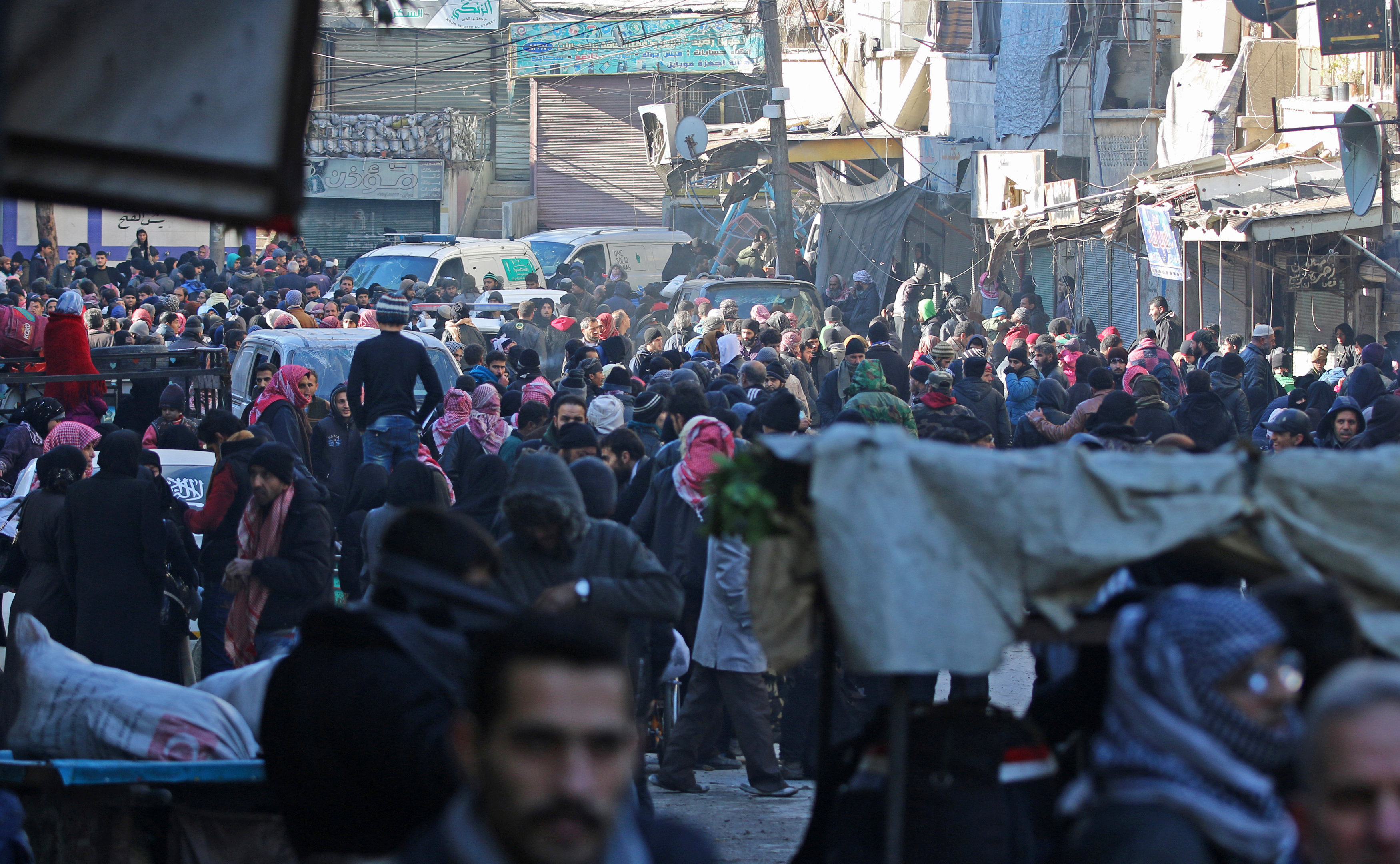
By Angus McDowall and Ellen Francis
BEIRUT (Reuters) – Thousands were evacuated from the last rebel-held enclave of the Aleppo on Monday after a deal was reached to allow people to leave two besieged pro-government villages in nearby Idlib province.
In bitter winter weather, convoys of buses from eastern Aleppo reached rebel-held areas to the west of the city, and more buses left the Shi’ite Muslim villages of al-Foua and Kefraya for government lines, according to a U.N. official and the Syrian Observatory for Human Rights, a monitoring group.
The United Nations Security Council agreed a resolution calling for U.N. officials and others to be allowed to monitor evacuations from east Aleppo and the safety of civilians still there.
The Syrian ambassador to the United Nations, Bashar Ja’afari, denounced the resolution as propaganda, saying the last of the rebels were leaving and Aleppo would be “clean” by Monday evening.
The recapture of Aleppo is Syrian President Bashar al-Assad’s biggest victory so far in the nearly six-year-old war, but the fighting is not over with large parts of the country still controlled by insurgent and Islamist groups.
Turkish Foreign Minister Mevlut Cavusoglu said 20,000 civilians had been evacuated from Aleppo so far.
Nearly 50 children, some critically injured, were rescued from eastern Aleppo, where they had been trapped in an orphanage, the United Nations said.
The evacuation of civilians from the two villages had been demanded by the Syrian army and its allies before they would allow fighters and civilians trapped in Aleppo to depart. The stand-off halted the Aleppo evacuation over the weekend.
“Complex evacuations from East Aleppo and Foua & Kefraya now in full swing. More than 900 buses needed to evacuate all. We must not fail,” Jan Egeland, who chairs the United Nations aid task force in Syria, tweeted.
INTENSE COLD, LONG WAIT
Ahmad al-Dbis, a medical aid worker heading a team evacuating patients from Aleppo, said 89 buses had left the city. “Some evacuees told us that a few children died from the long wait and the intense cold while they were waiting to evacuate,” he told Reuters.
For those still in rebel-held Aleppo, conditions were grim, according to Aref al-Aref, a nurse and photographer there.
“I’m still in Aleppo. I’m waiting for them to evacuate the children and women first. It’s very cold and there’s hunger. It’s a long wait,” he told Reuters. “People are burning wood and clothes to keep warm in the streets.”
Photographs of people evacuated from Aleppo showed large groups of people standing or crouching with their belongings or loading sacks onto trucks.
Children in winter clothes carried small backpacks or played with kittens. One older man, in traditional Arab robes and headdress, sat holding a stick.

Evacuees from a rebel-held area of Aleppo arrive at insurgent-held al-Rashideen, Syria December 19, 2016. REUTERS/Ammar Abdullah
BUSES BURNED
On Sunday, some of the buses sent to al-Foua and Kefraya to carry evacuees out were attacked and torched by armed men.
That incident threatened to derail the evacuations, the result of intense negotiations between Russia – Assad’s main supporter – and Turkey, which backs some large rebel groups.
The foreign and defence ministers of Russia, Iran and Turkey will hold talks in Moscow on Tuesday aimed at giving fresh impetus for a solution in Aleppo.
At stake is the fate of thousands of people still stuck in the last rebel bastion in Aleppo after a series of sudden advances by the Syrian army and allied Shi’ite militias under an intense bombardment that pulverised large sections of the city.
They have been waiting for the chance to leave Aleppo since the ceasefire and evacuation deal was agreed late last Tuesday, but have been prevented from doing so during days of hold-ups.
In the square in Aleppo’s Sukari district, organisers gave every family a number to allow them access to buses.
“Everyone is waiting until they are evacuated. They just want to escape,” said Salah al Attar, a former teacher with his five children, wife and mother.
CAMP IN TURKEY
Thousands of people were evacuated on Thursday, the first to leave under the ceasefire deal that ends fighting in the city where violence erupted in 2012, a year after the start of conflict in other parts of Syria.
They were taken to rebel-held districts of the countryside west of Aleppo. Turkey has said Aleppo evacuees could also be housed in a camp to be constructed in Syria near the Turkish border to the north.
For four years the city was split between a rebel-held eastern sector and the government-held western districts. During the summer, the army and its allies besieged the rebel sector before using intense bombardment and ground assaults to retake it in recent months.
A Reuters reporter who visited recaptured districts of Aleppo in recent days saw large swathes reduced to ruins, with rubble everywhere and sections of the famous Old City all but destroyed.
Traders began to return to their stores in the Old City to see if they could be fixed up.
One merchant, Jamal Deeb, said: “We are all here to see what the situation is like, and to consider reconstructing the stores. We do not want to leave things as they are, hand in hand we want to rebuild everything once again.”
Assad is backed in the war by Russian air power and Shi’ite militias including Lebanon’s Hezbollah movement and Iraq’s Harakat al-Nujaba. The mostly Sunni rebels include groups supported by Turkey, the United States and Gulf monarchies.
East of Aleppo, several villages held by Islamic State have been captured by the Syrian Democratic Forces, a coalition of militias backed by the United States that includes a strong Kurdish contingent, the Observatory said.
The advance is part of a campaign backed by an international coalition to drive Islamic State from its Syrian capital of Raqqa.
(Reporting by Angus McDowall, Humeyra Pamuk, Stephanie Nebehay, writing by Giles Elgood, editing by Peter Millership)



















